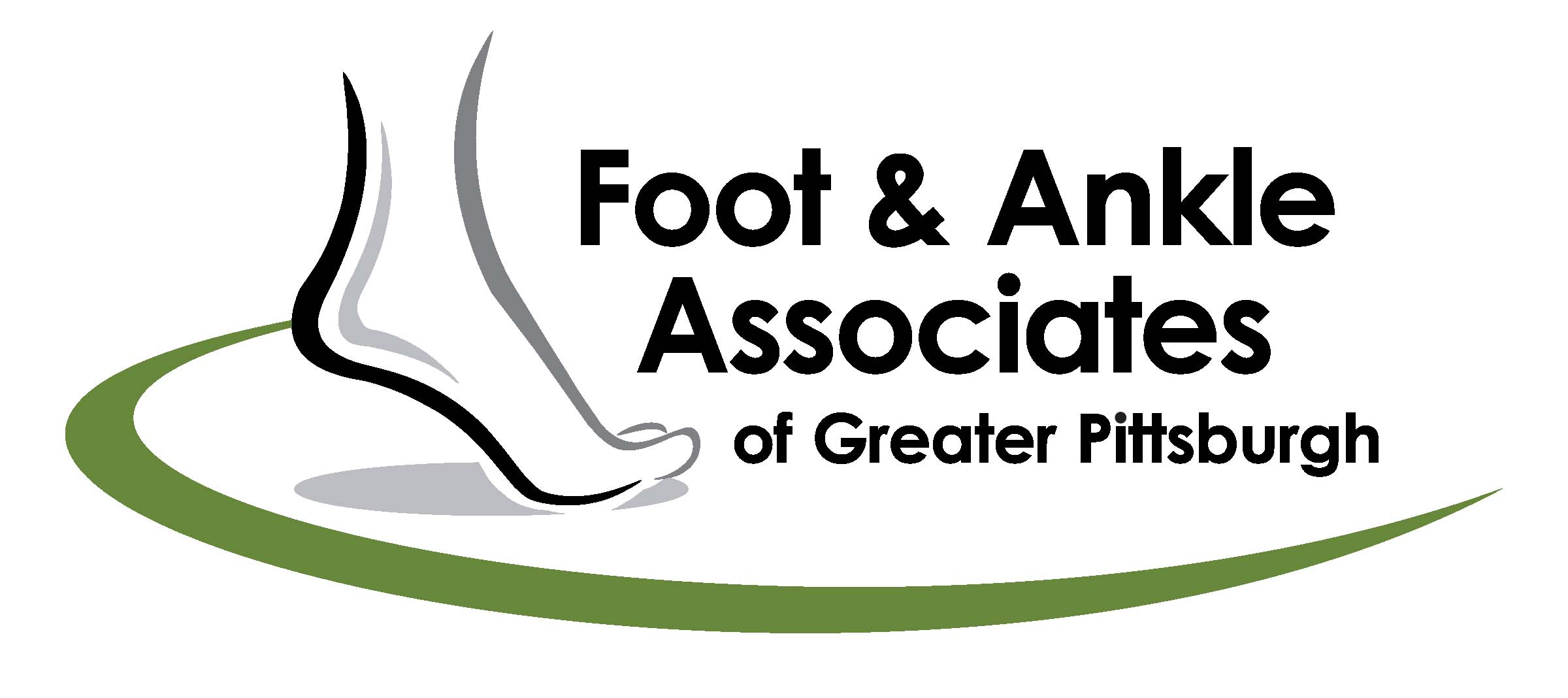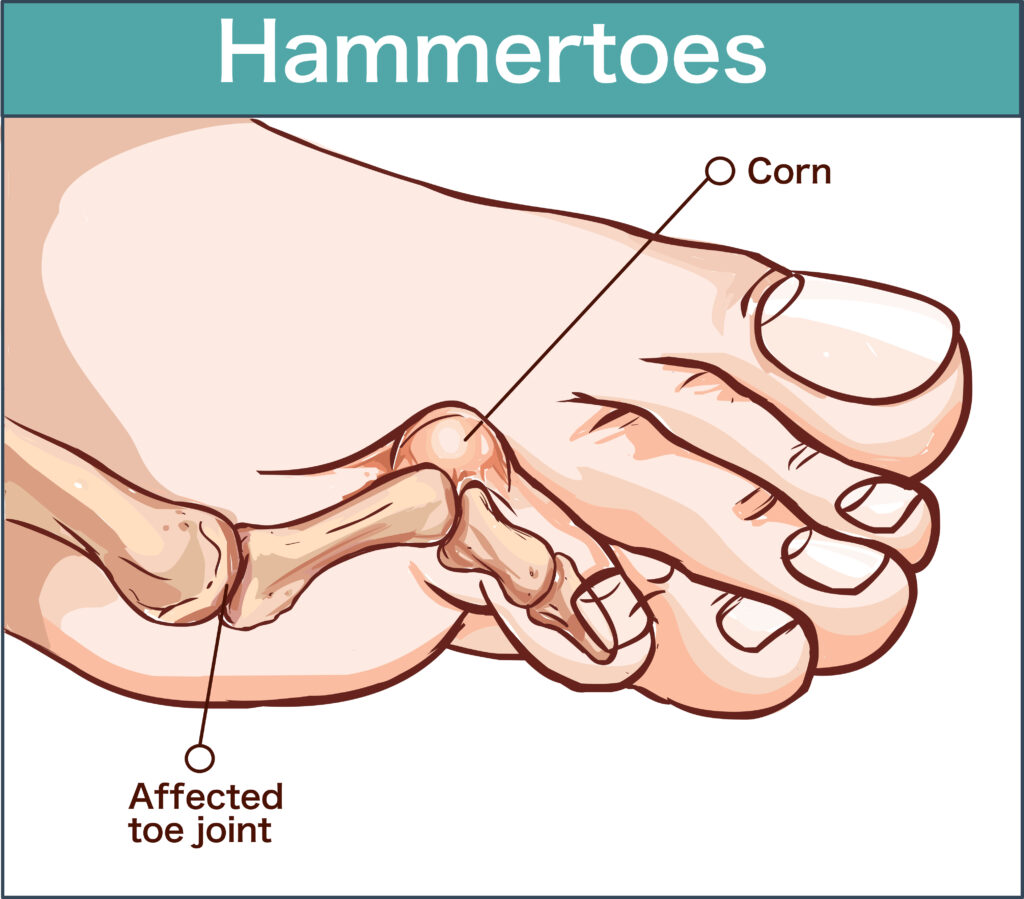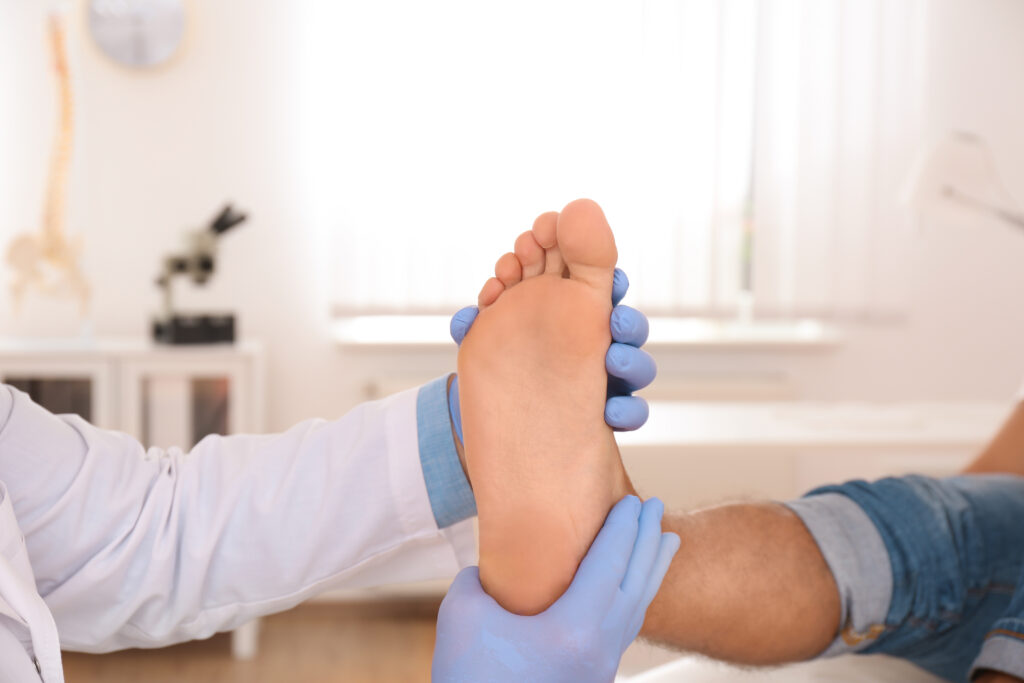Hammertoes
Bunions are caused by a misaligned joint involving your big toe and first metatarsal; hammertoes are a deformity caused by an abnormal bend in the middle joint of the toes.
Hammertoes can cause complications with mobility, flexibility, and comfort. Left untreated, they can also worsen and lead to the development of painful corns, calluses, blisters and arthritis. Finding shoes that fit properly with hammertoes is difficult, so if you struggle with hammertoes, you should seek help from our licensed physicians as soon as possible.
What are Hammertoes?
Hammertoes are bent toes at the middle joint, giving them the curve of a hammer. They can be mild or severe, flexible or rigid, and they get worse over time. Moving your feet can become painful, and you may have a difficult time walking because your hammertoes rub uncomfortably against the inside of your shoes.
People can develop hammertoes at any age, but they are more common among adults. As you age, the risk of hammertoes increases. Arthritis and neurological conditions can also increase the risk of developing hammertoes.
What Causes Hammertoes?
When the muscles and connective tissues in your toes are imbalanced, they cause the affected toes to become deformed. Hammertoes can affect just one toe, but many patients also find they have more than one toe involved on their foot.
Ill-fitting shoes are a common irritant of hammertoes as they force the feet to curl inward. When your shoes do not leave enough space for your toes to lie flat, you have an increased risk of developing a foot deformity.
Other potential causes of hammertoes are:
- Foot structure. Misaligned joints in the foot can change the way your tendons pull on the toe.
- Trauma to the foot. Forcefully stubbing your toe or breaking it could cause it to heal abnormally, resulting in a hammertoe shape. This is not a common cause, but it is a possibility.
- Neuromuscular abnormality. An underlying disease can cause hammertoes to develop by affecting the muscles, tendons, and ligaments in the feet.
- Nearly half of all people with diabetes have some type of foot deformity, and hammertoes are among the most common. Diabetes can cause nerve damage, loss of muscle control, and weakness that leads to hammertoe, mallet toe, or claw foot.
Treatment Options for Hammertoes
We offer hammertoe treatment in Beaver, PA, for patients of all ages. Our personalized care ensures that your entire health is taken into account, and we typically recommend starting with the least invasive treatments.
Below are some of the potential treatments for hammertoes we may suggest.
Conservative Options
With the least amount of invasive treatment, we help patients recover from hammertoes without the need for surgery. Some of our recommended interventions include:
- Crest pads that help alleviate pain and correct alignment.
- Wearing wider, taller shoes with more space for your toes.
- Using ice to reduce swelling and pain.
- Wearing custom orthotics to improve the support of your feet
Surgery
If non-invasive treatments are not effective enough, we can explore hammertoe surgery as another option. During this procedure, the surgeon will straighten and stretch your toe to improve its appearance and flexibility.
Our doctors will choose the best procedure for you based on the severity of your condition.
The most common hammertoe surgery technique involves removing arthritic bone from the painful joint and stabilizing the bone until healing occurs. Our surgeons will typically use a type of screw that permanently stays in your foot to prevent the need for another surgery.
Another surgical technique is a tendon transfer which moves the tendons in the affected toe to improve its appearance after removing the arthritic bone.
The third most common procedure is a joint resection that involves removing the end of the middle joint and using pins to keep your toe straight until it heals.
We will discuss all surgical options with you to decide on the best method for your condition. Our goal is to minimize pain and downtime, so you can recover quickly and return to life as normal.
Get Your Hammertoes Treated with Our Office
We are always here to help with any foot or ankle condition or issue. If you are looking for hammertoe treatment options near Beaver, PA, or in the greater Pittsburgh area, the Foot and Ankle Associates of Greater Pittsburgh are here for you.
Please call our office at (724) 774-1525, or send us a message today with any questions. Get your hammertoes evaluated before they become more painful.
Contact Us
Office
336 College Avenue, Suite 106, Beaver,
PA , 15009
Monday: 8am – 12pm
Tuesday: 8am – 4:30pm
Wednesday: 8am – 4:30pm
Thursday: 8am – 4:30pm
Friday: 8am – 12pm
Saturday: Closed
Sunday: Closed


